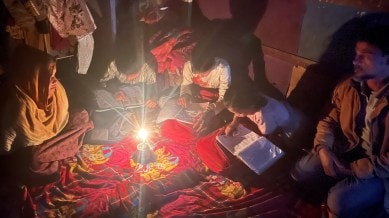Stay updated with the latest - Click here to follow us on Instagram
‘How can I study in the dark’: Electricity and water disconnection adds to Rohingya families’ woes in Jammu
Mohammad and Ismat, along with their eldest son Hassan – three years old at the time – came to Jammu in 2012 as refugees from Myanmar.

Struggling to read his textbook under the feeble light of a candle that he shares with the rest of his family, 12-year-old Zaib-ul-Hassan says: “It’s very difficult. How can I study in the dark?”
Their family is among around 400 Rohingya families living in different locations on the outskirts of Jammu, such as Malik Market, Kiryani Talab, Sunjwan, and others. Two weeks ago, authorities disconnected electricity and water supply to these families.
Mohammad and Ismat, along with their eldest son Hassan – three years old at the time – came to Jammu in 2012 as refugees from Myanmar.
Over the years, the couple had three more children – Zaib, Noor-ul-Hassan, 11, and Asma Jan, 8. While Noor is in class 2, Asma is not yet enrolled in school.
A few metres away from their house lives Bilqees, 11, along with her parents and four siblings.
“We have candles,” says Bilqees, a class 4 student, on how her family manages without electricity. However, she says things have been difficult: “It has been 10-15 days since the power supply was disconnected and that is causing many problems.”
Bilqees was born in India, after her parents moved to the country from Myanmar in 2012, along with the three children they had at the time.
Water troubles
The disconnected water supply is an even bigger issue for many. Jameel Hussain, who lives with his wife and three children aged between 3 and 10, says they have had to walk to far off localities to fetch water in buckets. He claims that local residents had been warned against helping them.
“I bring one-two buckets of water from a mosque in Kiryani Talab. With this, we have to fulfil all our daily needs, including cooking and drinking,” Jameel said
Officials of J&K’s Power Development and Jal Shakti departments have refused to comment on the issue.
A Power Development Department engineer, speaking on condition of anonymity, said: “We had received orders from the Jammu Deputy Commissioner’s office to disconnect electricity and water supply to plots where Rohangiyas were illegally staying.”
The Deputy Commissioner was unavailable for comment despite repeated calls and messages.
‘Can’t be treated like animals’
The National Conference government has called for the water and electricity services to be restored, and Jal Shakti Minister Javed Rana had said last week that he would talk to officials in this regard. However, while a few plots have since then had the services restored, for most others, they are still disconnected.
Chief Minister Omar Abdullah said that the Rohingyas “cannot be made to starve and die when they are here”.
Asking the Centre for clarity on their status, the CM said, “They were brought and settled here; that was not done by us. Now, if the Centre’s policy (on them) has changed, it should take them back.”
“If you (Centre) want to take them, then take them. However, as long as they (Rohingya) are here, they cannot be treated like animals. They are human beings and they shall be treated like humans,” Omar said.
According to official data, more than 13,700 foreigners, mostly Rohingyas and Bangladeshi nationals, live in various districts of Jammu and Kashmir.
Local residents who have rented out their land to Rohingya families say water and electricity bills for those plots have been regularly paid.
Detentions and unpaid rent
While the Rohingyas living in the area say they are certified as refugees by the United Nations High Commissioner for Refugees (UNHCR), the police conducted a verification drive in 2021 and claimed that over 270 of them were living there illegally. They were then picked up and lodged at a holding centre in Hiranagar.
However, the Rohingyas have claimed that even those with valid UNHCR refugee cards were among those picked up by the police.
Mohammad Hussain and wife Ismat Ara were among those picked up at the time. They were let off three days later after media reports on the plight of their four minor children who were left behind at their jhuggi at Kiryani Talab.
There are, however, still many families who have had their earning members lodged in the Haranagar facility, leaving the children to fend for themselves at the jhuggis.
Latief Ahmad, who rents his land to around 40-50 families who have built jhuggis there, says many have been defaulting on the monthly rent – between Rs 500 and Rs 1,000 – because the earning members of those families are in the holding centre.
Mohammad Fareed and his brothers have also rented out 60-70 jhuggis built on their plot. He says a number of those families have only minor children or women and have not been paying rent since 2021. “These helpless people have no place to go, and if we evict them, they will curse us,” Fareed says.